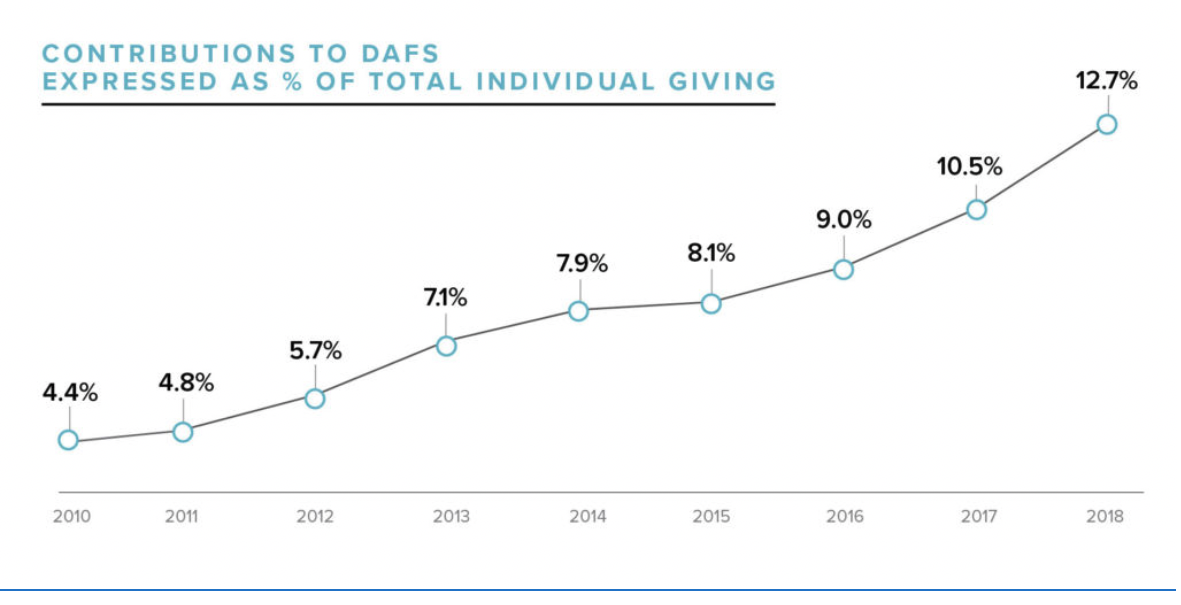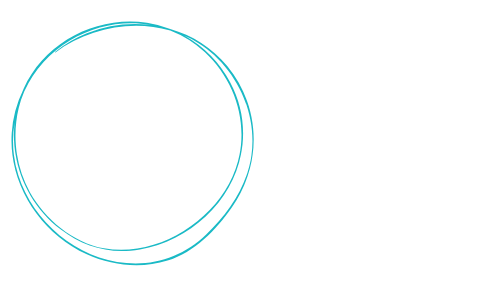DAF Information & Articles
Why a Donor Advised Fund (DAF)?
A Donor Advised Fund (DAF) is one of the most efficient ways to establish a qualified 501(c)3 tax advantaged charitable trust.
Donor Advised Funds have in excess of $121 billion in assets. Notable DAF contributors include Mark Zuckerberg of Facebook fame ($1billion) and Nicholas Woodman of GoPro ($500 million).
In 2018, philanthropists recommended grants to charities from their donor-advised funds totaling $23.42 billion. The same rapid growth also applies to contributions to donor-advised funds, which totaled $37.12 billion in 2018. This represents an 86 percent increase in contributions over the past five years.
Donor Advised Funds accept cash, publicly traded stocks and bonds, mutual fund share, restricted stock and IPO stock. You can donate appreciated stocks for more tax benefits.

Note: Individual giving estimates are from Giving USA 2019. All values reflect the most current data available from Giving USA 2019 and from National Philanthropic Trust’s collected data on donor-advised fund contributions based on IRS Forms 990 and estimates. We recognize that donor-advised fund contributions are not entirely from individuals. Using individual giving consistently as the denominator provides a continuous point of comparison.
Why contribute to a Donor Advised Fund rather than directly to a charity?
Donor Advised Funds provide a number of benefits that direct donations to a charity may not, including:
- Ability to accept and process appreciated securities in which the donor does not have to pay capital gains tax.
- Variety of investment options allowing the contribution to potentially grow over time.
- Capacity to receive one block of securities that can benefit multiple charities.
- Creation of a legacy versus providing a one time gift.
- Separation of tax planning and charitable giving. Donor receives tax deduction when contribution is made, but grants to charity can be made later.
- Simplicity – a single contribution can benefit multiple charities while only requiring one tax substantiation letter.
If you give private stock to a foundation you can deduct only what it cost you (your basis), whereas if you give it to a DAF, you can claim the full market value as a charitable deduction without ever paying taxes on the appreciation.
If you donate publicly traded appreciated stock to a private foundation, you can claim a deduction for its full market value, offsetting a maximum of only 20% of your adjusted gross income each year. But if you donate appreciated property (including private stock and real estate) to public charities, DAFs or a supporting org, it can offset 30% of your AGI.
Similarly, if you give cash to a private foundation it can offset only 30% of your income, compared with 50% for cash contributions to a public charity, DAF or supporting org. (In all cases any deduction you can’t use in the year of the gift can be carried forward for up to five additional years.)
The Bottom Line – Donor Advised Funds
-
Are Simple and Efficient
-
Are Tax Smart
-
Are Customized and Private
-
Are Flexible
You don’t need to be wealthy to set up a Donor Advised fund. The initial capitalization is minimal, (at Schwab Charitable the minimum is only $5,000), you get the advantage of an already established and approved 501 (c) 3 and there are no annual maintenance fees.
Donors can pool their resources to make a bigger impact. This is what we did at the MPB Fund. The four children of Mary Porcari Brady pooled their smaller individual resources to make a much bigger commitment and broader impact, that is still growing and providing benefits today.
Even very wealthy people are setting up DAF’s, to take advantage of two rewards:
Donor Advised Funds accept cash, publicly traded stocks and bonds, mutual fund share, restricted stock and IPO stock. You can donate appreciated stocks for more tax benefits.
Don’t just take our word for it – we have attached links to multiple independent articles on Donor Advised Funds, and details of their cost and tax efficiency for your information:
https://www.nptrust.org/reports/daf-report/
https://www.nptrust.org/what-is-a-donor-advised-fund/daf-tax-consideration/
https://www.glenmede.com/our-ideas/top-5-advantages-using-donor-advised-funds-charitable-giving
http://www.thenonprofittimes.com/management-tips/6-advantages-to-a-donor-advised-fund/
[2] Please consult your personal tax professional for advice and recommendations on your specific situation and options.
